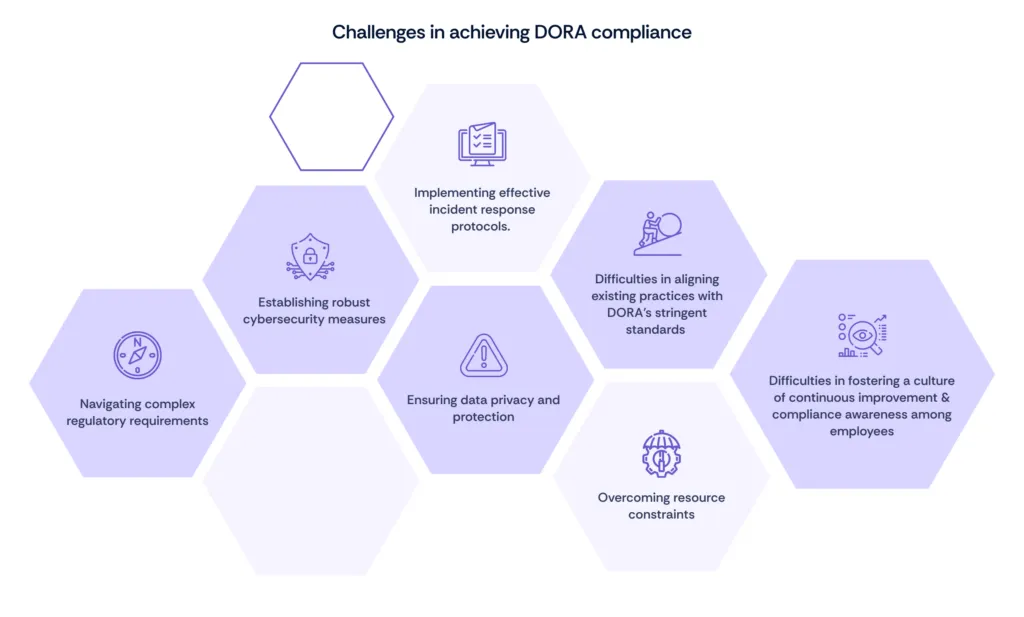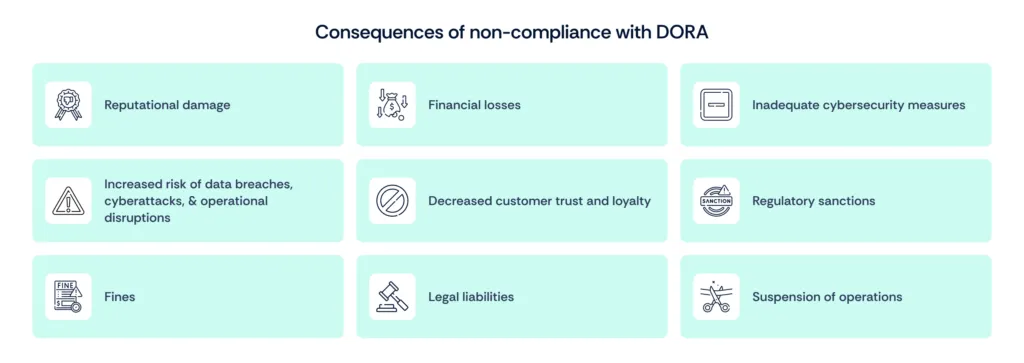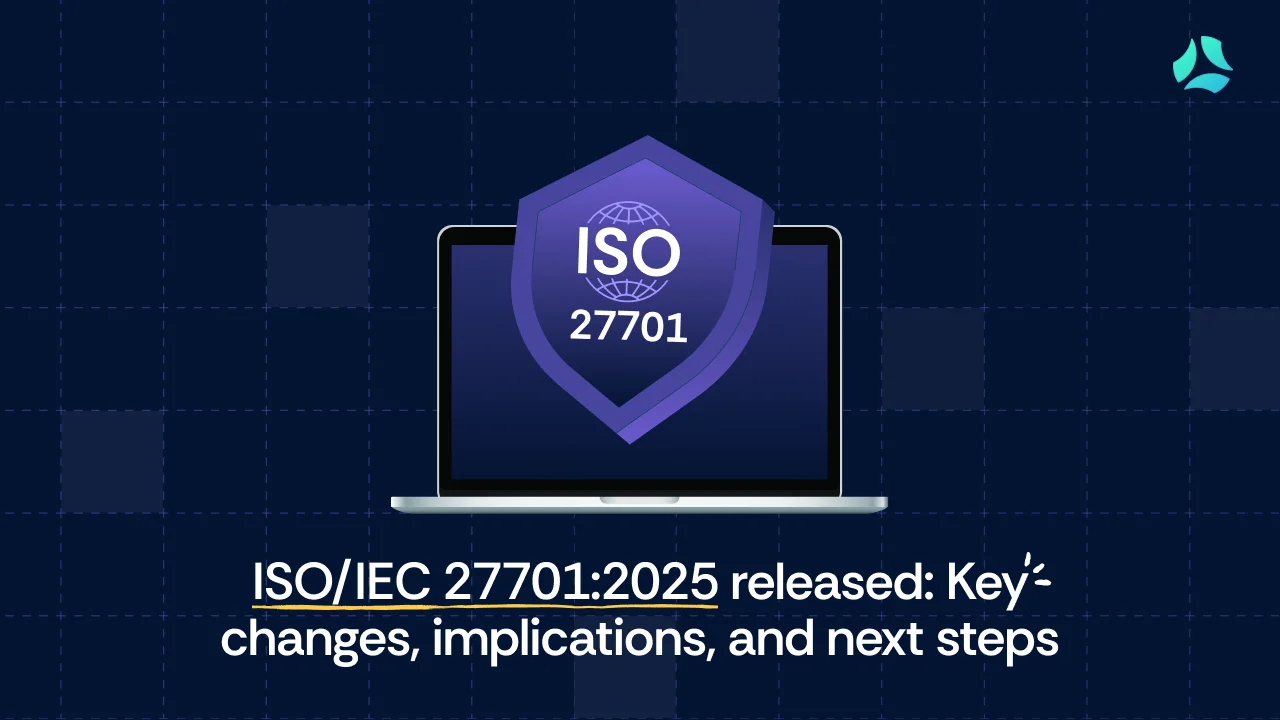How Scrut helps achieve compliance with DORA

The Digital Operational Resilience Act (DORA) represents a significant regulatory framework proposed by the European Union to ensure the operational resilience of the financial sector. It aims to enhance the cybersecurity and reliability of financial institutions by imposing stringent compliance requirements.
Scrut emerges as a pivotal tool for financial institutions striving to meet regulatory compliance standards. With its suite of monitoring, analytics, and automation features, Scrut empowers organizations to assess and strengthen their business continuity, thereby aligning with the mandates set forth by DORA.
Understanding DORA compliance and its importance
DORA introduces several key metrics and benchmarks aimed at assessing and enhancing the operational resilience of financial institutions.
These metrics include measures of cyber risk management, incident response capabilities, system availability, and data protection protocols. Understanding these metrics is crucial for organizations seeking to comply with DORA and demonstrate their commitment to operational resilience.
DORA compliance is vital for financial institutions to ensure the security, reliability, and availability of their digital infrastructure and operations. By adhering to DORA’s regulatory requirements, organizations can mitigate the risk of cyber threats, operational disruptions, and data breaches.
Compliance with DORA not only helps protect sensitive information but also fosters trust among customers, regulators, and stakeholders in the financial industry. As such, organizations must prioritize DORA compliance as a fundamental aspect of their operational strategy.
Challenges in achieving DORA compliance
Achieving compliance with DORA presents several challenges for organizations operating in the financial sector. Common hurdles include:

- Navigating complex regulatory requirements
- Establishing robust cybersecurity measures
- Ensuring data privacy and protection, and
- Implementing effective incident response protocols.
- Difficulties in aligning existing practices with DORA’s stringent standards
- Overcoming resource constraints, and
- Difficulties in fostering a culture of continuous improvement and compliance awareness among employees.
Consequences of non-compliance with DORA

Non-compliance with DORA can have severe consequences for financial institutions. These include:
- Reputational damage
- Financial losses
- Inadequate cybersecurity measures
- Increased risk of data breaches, cyberattacks, and operational disruptions
- Decreased customer trust and loyalty
- Regulatory sanctions
- Fines
- Legal liabilities
- Suspension of operations
These pose significant threats to the long-term viability and sustainability of organizations in the financial industry.
As such, understanding the implications of non-compliance is essential for motivating organizations to prioritize DORA compliance efforts.
Achieving DORA compliance with Scrut
Scrut’s comprehensive compliance management platform simplifies your journey towards achieving DORA compliance. With Scrut, you can easily track your progress across all frameworks, including DORA, and gain a clear understanding of your compliance status.
The platform breaks down your compliance into three key components: Policy, Evidence, and Tests. By leveraging Scrut’s advanced features, you can efficiently monitor and improve your overall progress toward meeting DORA requirements.
Streamlining your DORA compliance
On Scrut, you can quickly add the DORA framework, which comes pre-loaded and ready to use. The platform automatically maps the common elements of DORA with other frameworks like ISO 27001, SOC 2, and GDPR.
This mapping covers policies, evidence, and tests, showing you how much of the DORA framework you’ve already complied with, based on your existing adherence to these basic frameworks.
It also maps the total requirements of DORA, saving you from starting from scratch and avoiding repetitive work.
Customized compliance management
Scrut offers robust customization options to ensure your compliance approach fits your organization’s unique needs.
Policies: Scrut provides 45 customizable policy templates, or you can create new ones with the help of Scrut’s infosec experts. You can easily manage policies by assigning them to multiple people, uploading, approving, and publishing them. Controls can also be edited to align with your specific requirements.
Evidence: The Evidence module offers a wide selection of evidence types. Users can choose from existing templates, create new evidence, or seek assistance from Scrut’s experts to create custom evidence that meets specific needs. Once defined, evidence reviews occur regularly (e.g., quarterly), with review dates clearly displayed. Attachments can also be added for comprehensive documentation.
Tests: Scrut runs automated cloud (AWS, Azure) and application tests, with status indicators showing whether you are compliant, at risk, or in danger. The platform generates detailed test results, including concerns and remediation steps, which are automatically assigned to relevant team members for resolution. Resources and guides are provided to help resolve issues efficiently, with each task assignable to different individuals.
Seamless task management
Scrut integrates seamlessly with popular task management tools. You can create Jira tickets, Monday.com tasks, Shortcut stories, Linear issues, Asana tasks, or Azure work items directly from the platform. This integration ensures that assignees or relevant stakeholders, even those not using Scrut daily, stay informed and on track with compliance tasks.
Scrut in action!
Keka, a full-stack HRMS platform, manages payroll, hiring, onboarding, performance, and attendance for over 2.5 million users across 150+ countries.
As the company expanded internationally, they needed to comply with multiple frameworks to meet global regulatory standards. However, they faced these challenges:
- Fragmented security and compliance processes
- Manual, time-intensive vendor assessments
- Difficulty in presenting proper documentation to prospects
With Scrut, Keka achieved continuous compliance through constant control monitoring and gained transparency with actionable reporting and detailed logs. The platform strengthened internal security with periodic employee training, enabled smoother and error-free access reviews, and offered intuitive and collaborative vendor assessment workflows.
Keka was also able to demonstrate their security posture more easily, scale their GRC operations efficiently, and enjoy a low learning curve for their team.
Brikl, a disruptive player in the e-commerce setup and optimization space, had prior compliance experience but needed greater flexibility to tailor their GRC processes. Their previous platform lacked the customization they required.
Faced with a tight two-month deadline to renew their SOC 2 attestation, and with a team restructuring that involved onboarding new members unfamiliar with their compliance processes, Brikl faced significant challenges such as.
- Inflexibility in existing GRC processes
- Gaps in tracking, reviewing, and publishing artifacts
- A two-month deadline to renew SOC 2 attestation
- Training a new team from scratch on compliance processes
Scrut provided Brikl with a comprehensive overview of their compliance progress and helped identify critical areas. The platform improved collaboration across teams, streamlined evidence collection with seamless tech stack integration, and consolidated artifacts into a single repository with detailed version logs.
With Scrut’s support, Brikl was able to streamline audit preparation and receive end-to-end representation during audits. This foundation also positioned Brikl to pursue advanced CCPA certification in the future.
Wrapping up
DORA compliance is crucial for ensuring the resilience and security of organizations’ digital operations in today’s evolving threat terrain. Compliance with DORA requirements helps organizations mitigate cyber risks, protect sensitive data, and maintain operational continuity.
Scrut serves as a powerful tool for simplifying and streamlining DORA compliance efforts, offering a comprehensive suite of features and capabilities designed to automate, optimize, and enhance compliance processes.
Take the next step in your compliance journey by exploring Scrut’s capabilities and discovering how it can help your organization achieve and maintain DORA compliance effectively.
Frequently Asked Questions
1. What is DORA, and why is compliance important?
DORA stands for DataOps Ready Assessment, a set of best practices established by the DevOps Research and Assessment (DORA) organization. Compliance with DORA standards is essential as it ensures alignment with industry benchmarks for data management efficiency and effectiveness.
2. How does Scrut simplify the process of achieving compliance with DORA standards?
Scrut simplifies compliance with DORA standards by providing a comprehensive platform that automates assessment, monitoring, and reporting processes. Its intuitive interface and customizable features streamline the implementation of DORA best practices.
3. What are the key features of Scrut that aid in regulatory adherence?
Key features of Scrut that aid in regulatory adherence include real-time monitoring, automated data analysis, customizable reporting templates, and integration with existing workflows. These features empower organizations to proactively address compliance requirements.
4. Can Scrut be customized to suit the specific compliance needs of different industries?
Yes, Scrut can be customized to suit the specific compliance needs of different industries. Its flexible architecture allows organizations to tailor assessment criteria, reporting formats, and monitoring parameters to align with industry-specific regulations and standards.
5. How does Scrut ensure ongoing compliance monitoring and reporting to maintain regulatory standards?
Scrut ensures ongoing compliance monitoring and reporting by continuously collecting and analyzing data, generating actionable insights, and providing alerts for potential compliance issues. Its robust reporting capabilities enable organizations to track progress, identify areas for improvement, and demonstrate compliance to stakeholders.


















